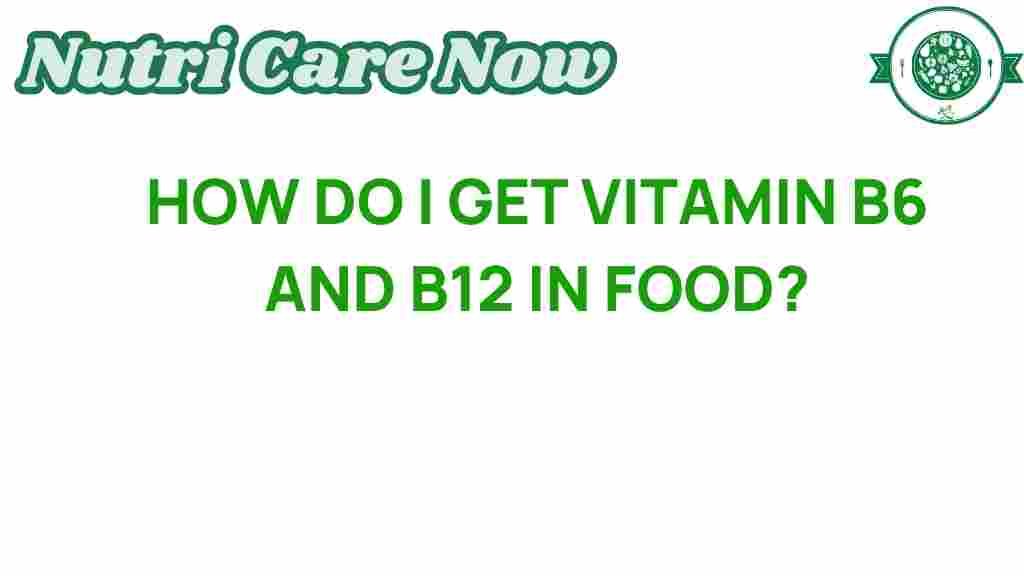Uncovering the Best Food Sources of Vitamin B6 and B12
Vitamins play a crucial role in maintaining our overall health, and among them, Vitamin B6 and Vitamin B12 are essential nutrients that contribute significantly to various bodily functions. These vitamins are vital for metabolism, brain health, red blood cell formation, and many other processes. In this article, we will explore the best food sources of Vitamin B6 and B12, their health benefits, and how you can incorporate them into your diet. We will also discuss the role of supplements and their importance in maintaining optimal levels of these vitamins.
Understanding Vitamin B6 and B12
Before diving into the food sources, let’s understand what Vitamin B6 and B12 are, their functions, and the symptoms of deficiency.
What is Vitamin B6?
Vitamin B6, also known as pyridoxine, is a water-soluble vitamin that plays a critical role in protein metabolism, cognitive development, and the production of neurotransmitters. It is also essential for immune function and the formation of hemoglobin.
What is Vitamin B12?
Vitamin B12, or cobalamin, is another water-soluble vitamin crucial for red blood cell formation, neurological function, and DNA synthesis. Unlike Vitamin B6, Vitamin B12 is primarily found in animal products, making it essential for certain dietary considerations, especially for vegetarians and vegans.
Health Benefits of Vitamin B6 and B12
Both Vitamin B6 and B12 offer numerous health benefits:
- Supports Brain Health: These vitamins are vital for maintaining cognitive function and may help prevent memory loss.
- Boosts Mood: Adequate levels of Vitamin B6 and B12 can help reduce symptoms of depression and anxiety.
- Enhances Immune Function: Both vitamins play a role in supporting the immune system.
- Reduces Risk of Anemia: Vitamin B12 is necessary for red blood cell production, helping to prevent anemia.
Best Food Sources of Vitamin B6
Incorporating Vitamin B6 into your diet is relatively easy, as it is found in a variety of foods. Here are some of the best food sources:
- Poultry: Chicken and turkey are excellent sources.
- Fish: Salmon and tuna provide a healthy dose of Vitamin B6.
- Potatoes: Rich in Vitamin B6, potatoes make a versatile side dish.
- Bananas: A convenient and nutritious snack high in Vitamin B6.
- Chickpeas: Great for salads and dips, chickpeas are a fantastic plant-based source of this vitamin.
- Fortified cereals: Many breakfast cereals are fortified with Vitamin B6.
- Nuts and seeds: Particularly pistachios and sunflower seeds.
Best Food Sources of Vitamin B12
Vitamin B12 is primarily found in animal products, making it crucial for those following a vegetarian or vegan diet to find alternative sources. Here are the best food sources:
- Fish: Fish such as salmon, trout, and sardines are rich in Vitamin B12.
- Meat: Beef and liver are among the richest sources of Vitamin B12.
- Dairy Products: Milk, yogurt, and cheese are excellent options for Vitamin B12.
- Eggs: Eggs contain significant amounts of Vitamin B12, especially in the yolk.
- Fortified Foods: Some plant-based milks and cereals are fortified with Vitamin B12, making them good sources for vegans.
Incorporating Vitamin B6 and B12 into Your Diet
To ensure you are getting enough Vitamin B6 and B12, consider the following dietary tips:
- Diversify your protein sources: Include both animal and plant-based proteins in your meals.
- Opt for whole foods: Choose whole grains, fruits, vegetables, nuts, and seeds over processed foods.
- Read labels: When purchasing cereals or non-dairy milk, look for fortified products.
- Plan meals: Create meal plans that incorporate a variety of food sources high in Vitamin B6 and B12.
Supplements: Are They Necessary?
If you are unable to meet your Vitamin B6 and B12 needs through diet alone, supplements may be beneficial. Here’s when to consider them:
- Vegetarians and Vegans: Since Vitamin B12 is primarily found in animal products, those following a plant-based diet should consider a supplement.
- Older Adults: As we age, our bodies may absorb vitamins less efficiently, making supplements a good option.
- Medical Conditions: Certain conditions can affect nutrient absorption, requiring supplementation.
Before starting any supplement regimen, it’s essential to consult with a healthcare professional to determine the right dosage and form of supplementation.
Potential Deficiency Symptoms
Understanding the symptoms of Vitamin B6 and B12 deficiency can help you take action before more serious health issues arise. Here are common symptoms:
- Fatigue: Low energy levels can be a sign of deficiency.
- Anemia: A lack of red blood cells can lead to symptoms like weakness and pallor.
- Neurological Issues: Tingling or numbness in the hands and feet may indicate a Vitamin B12 deficiency.
- Mood Changes: Depression and irritability can be linked to low levels of these vitamins.
Troubleshooting Nutrient Deficiency
If you suspect you have a deficiency in Vitamin B6 or B12, consider the following steps:
- Consult a Healthcare Provider: Get a blood test to check your vitamin levels.
- Revise Your Diet: Increase the intake of the food sources mentioned above.
- Consider Supplements: If dietary changes are insufficient, discuss supplementation with your doctor.
- Monitor Symptoms: Keep track of any changes in your health after making dietary adjustments.
Conclusion
Vitamin B6 and B12 are essential nutrients that play vital roles in maintaining health and preventing various disorders. By understanding the best food sources and incorporating them into your diet, you can ensure adequate intake of these important vitamins. Whether through whole foods or supplements, taking proactive steps to meet your nutritional needs is critical for overall well-being.
For more information on vitamins and nutrition, you can check out this resource. Remember, always consult with a healthcare professional before making significant changes to your diet or supplement regimen.
By making informed dietary choices, you can optimize your health and enjoy the numerous benefits that come from sufficient Vitamin B6 and B12 intake.
This article is in the category Diet and created by NutriCareNow Team

1 thought on “Uncovering the Best Food Sources of Vitamin B6 and B12”